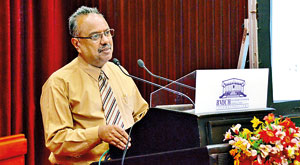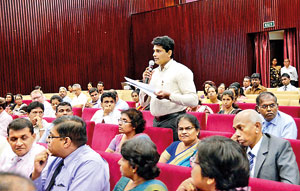News
Fresh effort to solve the ‘unknown’ aspect of CKDu

The Director of the Presidential Task Force on CKDu, Asela Iddawela addressing the gathering at the BMICH meeting on Tuesday
New life and vigour are to be infused to tackling the multi-faceted issues of the mysterious kidney disease that is felling farmers mainly in the North Central Province (NCP).
This is part of a concerted effort to crack the ‘u’ or the ‘unknown’ aspect of the Chronic Kidney Disease of unknown aetiology (CKDu), while also providing more relief to the beleaguered farmers of the NCP, the Sunday Times understands. More than 26,000 have been affected by CKDu up to January this year (2016).
While a National Action Plan for CKDu is under preparation and is to be submitted to President Maithripala Sirisena by the end of this month, a high-level three-hour meeting at the BMICH on Tuesday to ‘Call for priority action on CKDu in Sri Lanka’ saw several recommendations to be included in the action plan being discussed at length.
At this meeting organised by the Presidential Task Force on CKDu and the World Health Organisation (WHO), these recommendations were presented to around 200 including academics, clinicians, field personnel from provincial and district levels, ministries and civil society. The Presidential Task Force on CKDu set up in 2014 is headed by Director Asela Iddawela and the WHO Country Office for Sri Lanka by Dr. Jacob Kumaresan.
The recommendations had flowed forth from a three-day ‘International Expert Consultation on CKDu’, once again jointly convened by the Presidential Task Force and the WHO, from April 27-29.
Those who participated in the BMICH meeting on Tuesday were also given an in-depth briefing on the other major issues of ‘Research priorities’, ‘Cost-effective actions to be taken’ and ‘Monitoring and accountability framework’ discussed at the ‘International Expert Consultation’.
The Sunday Timeslearns that the consultation also came to a consensus on a three-tier approach of a National Committee on CKDu, which can provide overall oversight; the Presidential Task Force as the focal point for the proposed inter-sectoral coordinating mechanism; and the constitution of an Independent Expert Review Group (IERG) which could review ongoing interventions independently and report to the National Committee.

Audience members give feedback
With CKDu being a serious public health problem not only in Sri Lanka but also in several other countries, particularly in Central and Latin America, affecting poor, rural, male farmers in hot climates, the International Expert Consultation aimed to develop consensus on research priorities and cost-effective interventions for prevention and management.
Fifty-four national and international clinicians, researchers, epidemiologists, toxicologists, agriculture scientists, social scientists, hydrologists and other experts who represented the geographical and aetiological dimensions of the disease had sat down over the three days in April to review the knowledge on CKDu globally and in Sri Lanka.
While identifying gaps, prioritising an interdisciplinary collaborative research agenda and recommending interventions based on the available evidence, the experts had also developed a consensus on the monitoring and accountability framework for implementation of the recommendations.
The experts were from Sri Lanka, India, the United Kingdom, Australia, Cuba, El Salvador, Finland, Sweden, Canada and Costa Rica. The International Society of Nephrology, the Sri Lanka Society of Nephrology, the National Science Foundation of Sri Lanka, the Coordinating Secretariat for Science, Technology and Innovation in Sri Lanka, the WHO, international and national universities and public and private research institutes had been represented.
While on the first day, the experts defined future research priorities in four key areas, on the second day they identified priority cost-effective interventions.
The future research priorities in the four key areas are: Clinical aspects — early detection, treatment and care; role of agrochemicals; role of water/heavy metals; and role of heat stress/dehydration and miscellaneous hypotheses.
The priority cost–effective interventions identified are: Prevention; early detection, treatment and care; integrated surveillance and CKD registry; and social interventions, as CKDu has a huge social impact on patients and their families.
| The National Action Plan The recommendations to be included in the National Action Plan for CKDu are: · Develop a robust surveillance system to understand the burden, geographical distribution and time trends of CKDu in Sri Lanka. The surveillance system will include monitoring of potential toxins in the food, the water and the environment and provide a platform for long-term research to understand the role of potential risk factors and document the usefulness of ongoing interventions. · Establish a consortium of national/international researchers to conduct long-term interdisciplinary research. CKDu is a complex disease and there is a need for sharing expertise across disciplines and countries to accelerate knowledge dissemination; guide the research agenda; and help solve the mystery of ‘u’ (unknown) in CKDu. The WHO will facilitate researchers from global CKDu hotspots to engage in research exchange. · Strengthen the implementation of available interventions namely, early detection and management of CKDu in the early stages and dialysis in the late stages. In addition, prioritise the provision of safe drinking water and food in the affected areas and ensure safe use of agrochemicals based on the current status of knowledge and evidence. An evaluation component should be in-built into these interventions to understand their impact and modify the interventions if needed. · Provide social support at the three levels of patient, family and community. Build the capacity of existing community-level workers, appoint trained para-medical personnel and social workers in appropriate locations and expand and strengthen social support services and resources. Develop a sound communication strategy to de-stigmatise the disease. Livelihood generation in affected areas was also recommended. · Strengthen/expand human resources at various levels such as nephrologists, renal care nurses, social workers at the nephrology units and field-level to enhance the coverage of renal care services and provide psychosocial support to patients and families. · Develop a framework for monitoring and accountability to ensure timely implementation of the activities. A three-tier system was proposed, consisting of a National Committee on CKDu, an inter-sectoral coordinating mechanism coordinated by the Presidential Task Force and an Independent Expert Review Group. The framework will have its set of performance indicators based on the National Action Plan. This will enable open and transparent measurement as well as communication.
|

